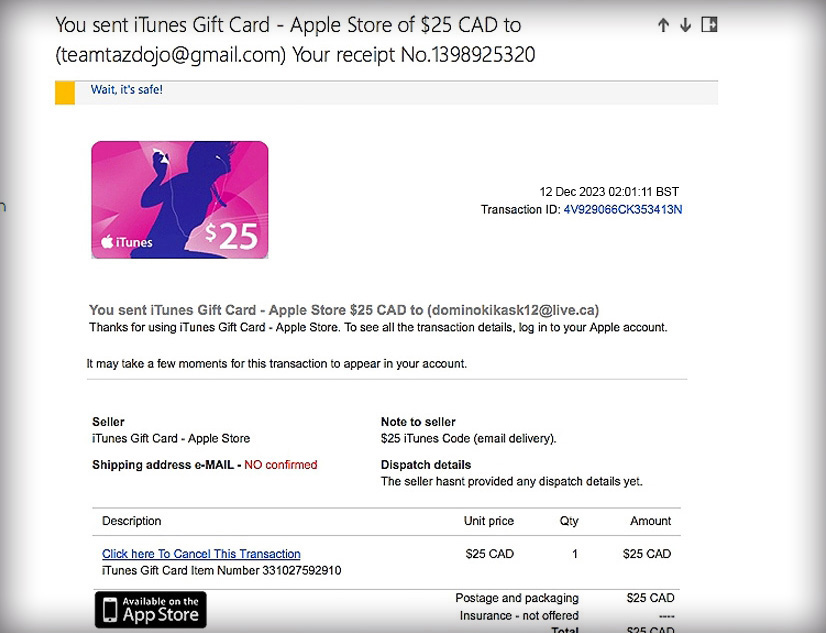Dangerous Christmas Trends Everyone Should Be Aware Of This December
During holidays, people are always giving, generous, and open-hearted. However, the holidays spirit represents a two-edged sword when purchasing things online for those we love. Every year, the number of fraudulent activities is increasing. Below is a list I've compiled with the Top 10 holiday scams this season, exposed for consumers' protection.
Watch the video below to see the most prevalent scams exposed:
Scam Detectors Most Trusted Websites in Online Security
- Guard.io (100): Surf the web safely. Clean up your browser, remove maliscious extensions and check for privacy violations.
- Incogni.com (100): Delete your personal data from the internet and protect against scams and identity theft.
- ExpressVPN (100) Stay secure and anonymous online - Best VPN Out There
However, I have a few more below. Ready?
1. Bogus Gift Certificates
Everyone is on social media these days. That includes cyber-criminals, as well. During the holiday season, scammers often promote fraudulent gift certificates using social media as their forum. They're looking for personal identification information, which is then sold to other cyber-crooks. How do they get you on their hook?
Watch the video below to see a full report on Gift Card Holiday Scams:
2. iTunes Gift Card
You might receive an email claiming to be from iTunes (see image below). The text will read: “You sent an iTunes Gift Card of $200 to (teamtazdojo at gmail.com). Your receipt No.114509772”. A gift card image is presented, as well as an invoice.
See the screenshot below:

The trick is that the invoice provides a link “to cancel” if you don't recognize the transaction. If you click on it, you are taken to a fake website where you are asked for personal information.
Always get your iTunes cards from…iTunes or their official reps. Random emails sending you to questionable websites are out of the question.
3. Facebook, Twitter and Instagram Deals
Most of us communicate with Facebook, X (former Twitter), and Instagram. Let's say you've posted something about a holiday gift you are trying to find. Within minutes, you receive a direct message (or are tagged by another user) offering to sell you the item you are looking for. This trick could easily be a sophisticated scam.
From landing on a replica website of a legitimate shopping store to hijacking your credit card number is just a tiny step. December is also the month with the most counterfeit goods sent as originals to purchasers.
Unless you know the person that has messaged or tagged you think twice before accepting any offers. If you do decide to take a chance, never pay upfront for any item purchased this way. Remember, if something seems too good to be true, it most likely is.
4. Wi-Fi Trap
You decide to shop online for Christmas gifts but don't want your family to be able to check the history on your home computer to see what you're buying. Instead, you may do it from your smartphone or tablet while out in a coffee shop or mall. This way, you can check prices online with other outlets, too.
Be very wary; doing so could lead to your credit card information theft. Scammers often put out a wi-fi signal that has a similar name to the place you're at (malls and coffee shops typically have free wi-fi). Your credit card information is at risk if you purchase an item online from a public place with free wi-fi.
The best way to avoid cyber-criminals is never to enter your credit card information while using wi-fi in a public place. Remember, while you are online shopping for gifts, they are online shopping for easy-to-steal credit card information.
5. Duplicate Websites
Cybercriminals will stop at nothing to obtain personal information from their victims. This includes the elaborate scheme of building complete copies of well-known sites and then sending emails promoting great deals.
Of course, once you have “shopped” on their site – for merchandise that never arrives – your credit cards and possibly your identity have been compromised.
When shopping online, make sure you use only secure sites, as indicated by the https:// in their web address. If the address begins with http://, steer clear. This is an unsecured site, and your information could be compromised.
If you feel a website might be suspicious, feel free to verify it using our unique Scam Detector validator for free. Click here to <a href=”https://www.scam-detector.com/validator/” target=”_blank” rel=”noopener noreferrer”>check scam websites</a>.
6. Puppy For Christmas Gift
A massive number of children want a puppy for Christmas. Therefore, many parents look online for the perfect gift for their kids. If you are one of them, you might find someone willing to give a pet away (or sell one for a small price). The pictures are cute, and you fall in love with the animal. It could even be advertised as a “perfect Christmas gift for your kid or his/her birthday”. How does the scam work?
Watch the video below to see the Pet For Christmas Scam exposed:
You contact the person, and they explain that they just moved out of the country. Meanwhile, they say the pet has a horrible time accommodating to the new climate. After exchanging a few emails and building trust, the ‘owner' of the animal will only require that you pay for the shipping, asking in return that you promise to take good care of the pet.
After you wire the money, it will be the last you hear from them since the pet never existed in the first place. The scammer just used Internet pictures with cute puppies.
The crook could also approach victims by saying his spouse died, and now he needs to get rid of all the things that remind him of the deceased.
Buy pets from your town at local stores – tons need love. This way, you can go and pick them up yourself.
7. Holidays E-Card
During holidays, many people send e-cards to their loved ones. But beware of ones received from unknown senders. Many scammers proceed to send malicious e-cards that contain malware that will infect your computer upon opening.
Simply put, never open e-cards from people you don't know, no matter how enticing the subject line may be. Be especially cautious of e-cards sent to your work address; you don't want to be job hunting after the holidays because you infected the entire server at your workplace!
8. Shopping Trends
Traditionally, a couple of “must-have” items appear on everyone's Christmas list every year. Cyber-criminals have done their homework and are well aware of which things are also on the hit list.
They often build fake websites claiming to contain the items at almost too good-to-be-true discounts. These websites get pushed high onto search engines, ensuring a steady stream of clicks; malware will infect your PC once clicked.
The best line of defense is a good offense. Keep your web browser fully updated to ensure you receive warnings of unsafe sites before clicking on them.
9. Make Extra Money During Holidays
While legitimate work-from-home opportunities exist, one must be very careful not to fall prey to the scams that seem to multiply daily during the holiday season. These fraudulent sites require you to complete a form with personal identifying information such as your social security number. This, of course, results in identity theft. The worst of these sites involve actual work – laundering money from cyber-heists.
Do your homework. Do an internet search of the name of the company you are considering working for. You can find a wealth of data simply by taking this one step. Be leery of giving your personal information to any company with a poorly constructed website or no history when you do an internet search.
10. Holidays Custom Credit Card
Many people affected by the pandemic have been looking for ways to provide a lovely holiday season for their families. Unfortunately, this leaves them vulnerable to Internet swindlers who advertise pay-in-advance scams for credit cards.
These emails (sent through spam) advertise “prequalified, super-low interest” credit cards and loans if the victim pays a processing fee upfront.
Never believe pre-paid loans or credit card offers; they are simply not legitimate. No honest lender is going to offer credit for an upfront fee. And always be wary of any offer that comes unsolicited to your email. This is a red flag that the request is bogus.
Another scam that you should be aware of this season is the Secret Sister Gift Exchange Scam.
How To Report a Holiday Scammer
Warn your family and friends know about these holiday scams. Feel free to share the article if it was helpful. However, you can report crooks and any suspicious activity officially to the Federal Trade Commission, the Office of the Inspector General, and the FBI Internet Complaint Center by using the pages below:
Report To The FTC
Submit Claim To The Office of the Inspector General
Report To The FBI Internet Complaints Center
How To Protect Yourself More
Do you want to receive alerts about the most notorious scams on a regular basis? Subscribe to our scam alerts. You will receive periodic emails from Scam Detector with exclusive tips. Those will include info on how to prevent fraud and insights about the newest tools you can use to fight crime.
Feel free to explore additional articles on holiday scams. You can find them listed below this paragraph, so that you know more about online security. Last but not least, if you had any bad experiences, make sure to use the comments section below to expose other scammers.
Verify a website below
Are you just about to make a purchase online? See if the website is legit with our validator:
vldtr®


TOP 4 MUST-WATCH FRAUD PREVENTION VIDEOS
1. Top 5 Amazon Scams in 2024 2. Top 5 PayPal Scams in 2024 3. How To Spot a Scam Email in 2024
- Latest Posts by Selma Hrynchuk
-
Compromised Credit Card Scam
- -
Fake Google Chrome Update
- -
Facebook Privacy Notice Hoax
- All Posts













